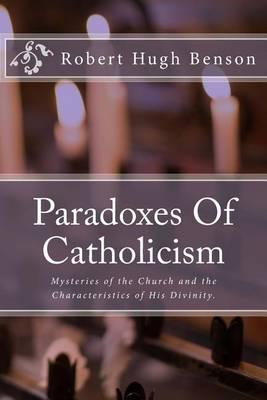Overview
We have considered, so far, a number of paradoxical phenomena exhibited in the life of Catholicism and have attempted to find their reconciliation in the fact that the Catholic Church is at once Human and Divine. In her striving, for example, after a Divine and supernatural Peace, of which she alone possesses the secret, she resists even unto blood all human attempts to supplant this by another. As a human society, again, she avails herself freely of human opportunities and aids, of earthly and created beauty, for the setting forth of her message; yet she can survive, as can no human society, when she is deprived of her human rights and her acquired wealth. As human she numbers the great multitude of the world's sinners among her children, yet as Divine she has produced the saints. As Divine she bases all her gospel on a Revelation which can be apprehended only by Faith, yet as human she employs the keenest and most profound intellects for its analysis and its propagation. In these and in many other similar points it has been attempted to show why she offers now one aspect and now another to human criticism, and how it is that the very charges made against her become, when viewed in the light of her double claim, actual credentials and arguments on behalf of that claim. Finally, in the meditations upon the Seven Words of Christ, we considered very briefly how, in the hours of the deepest humiliation of His Humanity, He revealed again and again the characteristics of His Divinity. It now remains to consider that point in which she most manifests that double nature of hers and, simultaneously therefore, presents, as in a kind of climax, her identity, under human terms, with Him Who, Himself the Lord of Life, conquered death by submitting to it and, by His Resurrection from the dead, showed Himself the Son of God with power.
Full Product Details
Author: Robert Hugh Benson
Publisher: Createspace
Imprint: Createspace
Dimensions:
Width: 15.20cm
, Height: 0.70cm
, Length: 22.90cm
Weight: 0.181kg
ISBN: 9781494994785
ISBN 10: 149499478
Pages: 128
Publication Date: 13 January 2014
Audience:
General/trade
,
General
Format: Paperback
Publisher's Status: Active
Availability: Available To Order

We have confirmation that this item is in stock with the supplier. It will be ordered in for you and dispatched immediately.
Author Information
Robert Hugh Benson (18 November 1871 - 19 October 1914) was the youngest son of Edward White Benson, Archbishop of Canterbury, and younger brother of Edward Frederic Benson. Benson was educated at Eton College, and then studied Classics and Theology at Trinity College, Cambridge, from 1890 to 1893. In 1895, he was ordained a priest in the Church of England by his father, Edward White Benson, who was then Archbishop of Canterbury. After the death of his father in 1896 he was sent on a trip to the Middle East to recover his own health. While there, he began to question the status of the Church of England and to consider the claims of the Roman Catholic Church. His own piety began to tend toward the High Church variety, and he started exploring religious life in various Anglican communities, eventually obtaining permission to join the Community of the Resurrection. Benson made his profession as a member of the community in 1901, at which time he had no thoughts of leaving the Church of England. But as he continued his studies and began writing, he became more and more uneasy with his own doctrinal position, and on 11 September 1903 he was received into the Roman Catholic Church. He was ordained a Catholic priest in 1904 and sent to Cambridge. He continued his writing career along with the usual elements of priestly ministry. He was named a monsignor in 1911. (Source: Wikipedia)




